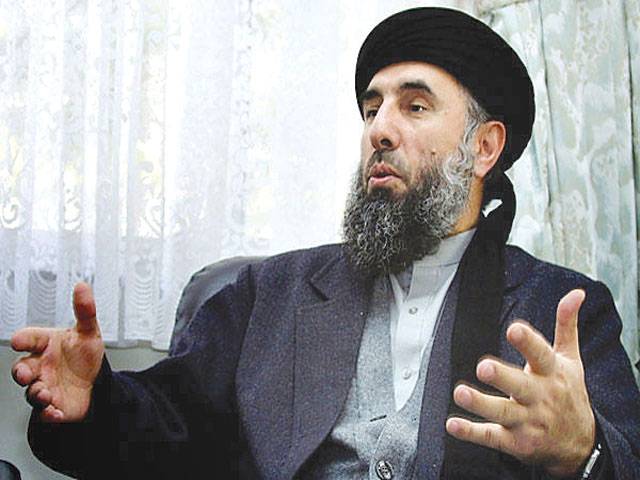LAHORE: Hizb-i-Islami Afghanistan chief Gulbuddin Hekmatyar has proposed intra-Afghan talks, “without mediation from any foreign power”.
In a written interview to The Nation, he also gave a formula for peace in his war-ravaged country, an end to war across the country being an important component of it. If any group tries to continue war on being incited, all other parties should try to address its reservations and persuade it to bury the hatchet. But if it doesn’t, the entire nation should fight against it, said the former prime minister of Afghanistan.
Mr Hekmatyar’s peace plan, ostensibly, leaves no mediatory role for Pakistan although it has been doing its best to bring the Afghan government and the Taliban to the negotiating table. The two sides have already held a round of talks and the second was due to be held in Murree some weeks ago when the belated news of Mullah Omar’s death a few years ago led to an indefinite postponement. After that the fighting in Afghanistan has intensified, with the Afghan president alleging that “message of war is coming from Pakistan”, which leaves little hope for resumption of talks in the near future.
The HIA chief said talks should be comprehensive and their agenda be decided keeping in sight the ground realities. He did not identify the parties that should take part in the negotiations. He said all parties should agree that foreign troops leave Afghanistan by the end of the current year; all security agencies should continue to function as usual, and a powerful commission be set up to bring all institutions into the mainstream. Anybody who had supported the Soviet Union or NATO forces or wants the foreign forces to stay on in Afghanistan should be removed as head of any security institution.
Such changes should be brought about in the government as are acceptable to all and the governor, police chief or head of any security agency should not be from their native provinces, said Mr Hekmatyar. He said election for the president, national and provincial assemblies should be held in 2016. These elections should be free and fair, held on the basis of proportional representation. Only the national level parties should contest the elections, he said, highlighting the divisive role of the smaller parties. Every Afghan national should serve the army for at least a year to strengthen national defence with a smaller army. The country cannot afford to have a 350,000 strong army, he maintained.
In response to a question, Hekmatyar said there would be no difference in the policies of former president Hamid Karzai and incumbent Ashraf Ghani in the presence of foreign troops.
Q: Pakistan has been providing shelter to millions of Afghan refugees for more than three decades. Despite this great sacrifice the relations between the two countries have never been tension-free except during the brief period of the Taliban rule. Why is it so? Who doesn’t want the bilateral ties to normalise? Why Afghanistan feels closer to India than to Pakistan in spite of all that Islamabad did for Afghanistan?
A: After occupation, the US handed over power to those who have links to the enemies of Pakistan. To justify the occupation, the US shows an invisible enemy as a threat to Afghanistan so the latter takes the US as a well-wisher and considers the presence of foreign troops on its soil necessary. Today the print and electronic media of Afghanistan are projecting Pakistan as the biggest enemy of their country. All these media institutions were either set up or are controlled and funded by the US or they belong to the pro-US elements fiercely opposed to Pakistan. Pakistan is suffering because of its own mistakes. Sibghatullah Mujaddadi, Burhanuddin Rabbani and Hamid Karzai were appointed presidents of Afghanistan either in Pakistan or with its backing, despite the fact that they were friends of the enemies of Pakistan.
Q: What should both the countries do to be good neighbours? Who should take what first step for the purpose?
A: In the presence of the US troops and the incumbent Afghan government neither Islamabad nor Kabul can take any initiative that can improve bilateral ties. Answering a question, the HIA chief said the messages of war were coming from Washington. He made it clear that peace in Afghanistan would not be possible in presence of foreign troops and the incumbent Afghan government. He said the US could not restore peace despite the presence of 150,000 troops and support from 48 countries of the world, including Pakistan and Iran.
“Had Pakistan and Iran not supported, American forces could not occupy Afghanistan so easily and sustain the occupation till today”. He claimed the present Afghan govt would not stay for long after the foreign troops left. According to him, US President Obama wanted to pull out his forces from Afghanistan by the end of 2016, but Russia wanted the US troops engaged there for its own interests in Ukraine and Syria. He alleged that Russia had played a role even in the recent conflict in northern Afghanistan. This conflict reinforced the US thinking that it should not pull out its troops from
Afghanistan in haste. Even Berlin and other European countries believed that Moscow’s interests would be served if the US and NATO forces made the mistake of taking out troops. Hekmatyar said in categorical terms that his party was neither in contact with the ISIS nor had it issued any statement in its support. He said the HIA believed that the emergence of Al-Qaeda and ISIS was in reaction to the atrocities being perpetrated in Iraq and Palestine. In case the two organisations were eliminated, they would resurface with some new nomenclature.






